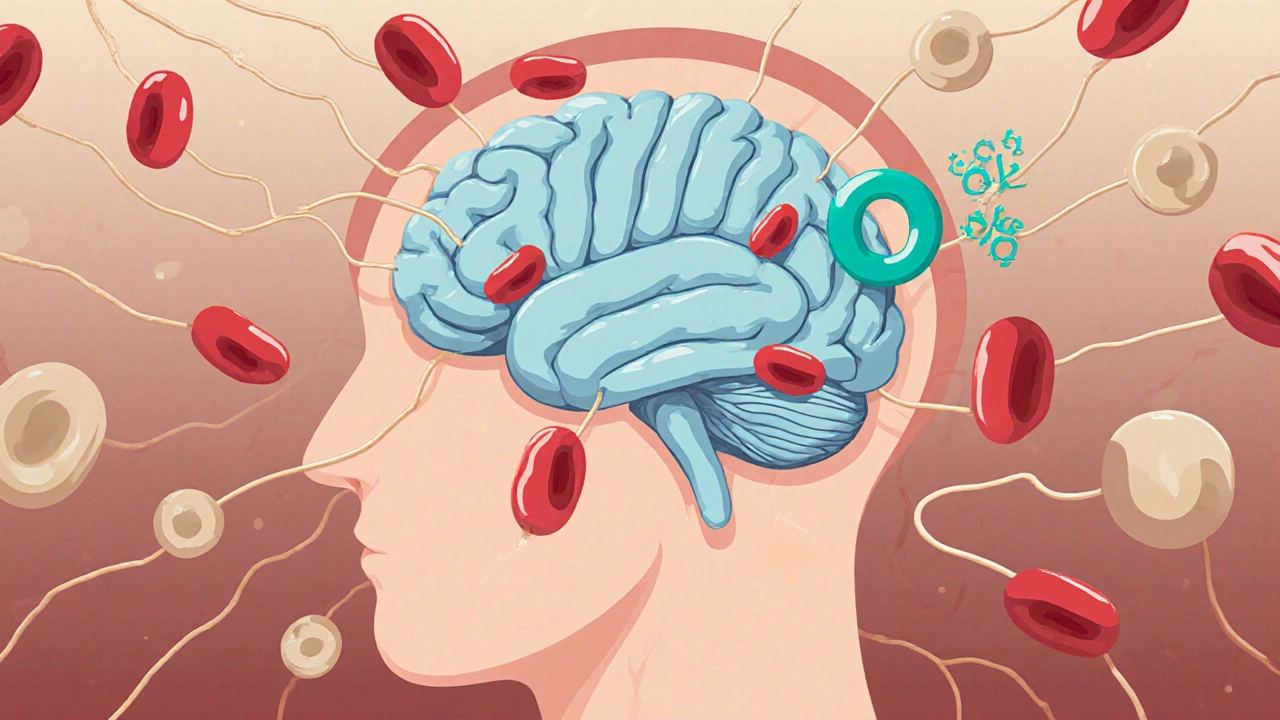
Nutritional Anemia and Brain Power: How Deficiencies Impact Cognitive Function
Explore how iron, B12, and folate deficiencies cause anemia and impact brain health, with symptoms, science, and practical steps to protect cognition.
When working with Vitamin B12 Deficiency, a condition where the body lacks enough cobalamin to support normal blood and nerve functions. Also known as cobalamin deficiency, it can lead to fatigue, numbness, and memory problems. This shortage isn’t just a lab number; it shows up in everyday energy levels, mood, and even how well you think. Below we break down the main pieces that drive the condition and what you can do about it.
The first piece of the puzzle is Vitamin B12, an essential water‑soluble vitamin found mainly in animal‑based foods. Also called cobalamin, it’s the star nutrient that fuels red blood cell production and nerve health. Without enough of it, the body can’t make healthy blood cells, leading to Anemia, a reduction in red blood cells or hemoglobin that causes tiredness and shortness of breath. Another critical factor is Intrinsic Factor, a protein secreted in the stomach that binds vitamin B12 so it can be absorbed in the small intestine. When this protein is missing or damaged, even a diet rich in B12 won’t fix the problem.
Beyond blood, the nervous system feels the hit hard. Neurological Symptoms, issues like tingling, balance problems, and memory lapses caused by inadequate nerve myelination, often appear later but can become permanent if ignored. The link is clear: vitamin B12 deficiency encompasses anemia and neurological symptoms, requiring both dietary and absorption‑related solutions.
So how does the body end up short on B12? The most common reasons include a diet low in animal products, pernicious anemia (autoimmune attack on intrinsic factor), stomach surgeries that reduce acid, and chronic medications like proton‑pump inhibitors that lower stomach acidity. Each cause points to a different part of the absorption chain—diet, stomach lining, or small‑intestine function.
Diagnosing the issue usually starts with a simple blood test measuring serum B12, methylmalonic acid, and homocysteine levels. Low B12 paired with high methylmalonic acid confirms a true deficiency rather than a lab artifact. Doctors also check for anemia markers and nerve function, especially if patients report numbness or coordination trouble.
Treatment hinges on fixing the missing vitamin and the root cause. Oral supplements work for most diet‑related cases, while high‑dose sublingual tablets or injections are needed when absorption is blocked. Intramuscular injections bypass the gut entirely and quickly raise B12 levels, often resolving anemia in weeks and neurological signs over months.
But supplementation isn’t the whole story. Lifestyle tweaks can keep levels stable—include B12‑rich foods like meat, fish, eggs, and dairy, or fortified plant milks for vegans. For those with absorption issues, lifelong supplementation may be required, and regular monitoring ensures levels stay in the healthy range.
Our collection of articles below dives deeper into related health topics that intersect with B12 deficiency. You’ll find detailed comparisons of antibiotics, insights on antipsychotic medications, and guides on managing other nutrient‑related conditions. Each piece adds a layer of context, helping you see how B12 fits into the broader picture of medication interactions, disease management, and overall wellness.
Ready to explore the full range of resources? Below you’ll discover practical advice, side‑by‑side drug comparisons, and the latest health news—all curated to give you a well‑rounded view of how vitamin B12 deficiency interacts with other medical topics.

Explore how iron, B12, and folate deficiencies cause anemia and impact brain health, with symptoms, science, and practical steps to protect cognition.